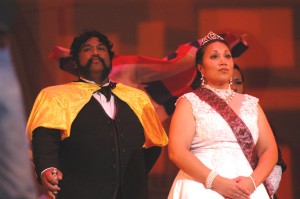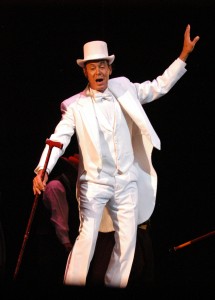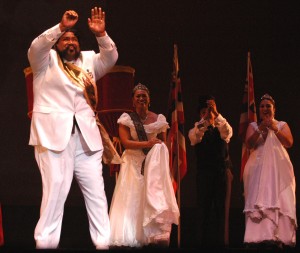Mark Ho’omalu and a “Kingdom Denied”
“Get your papers!” cried the delivery boys and girls, carrying rolled up copies of a Hawaiian newspaper printed especially for that evening’s show. Wearing natty caps and suspenders, they ran through the aisles clutching copies of the “Star of the Pacific,” yelling, “Get your papers!”
Thus began an extraordinary one-night performance of the musical “Kingdom Denied,” which was written by kumu hula Mark Keali’i Ho’omalu, founder of the Academy of Hawaiian Arts in Oakland, Ca. I’d interviewed Mark for a page one story in the Wall Street Journal last year about mainland hula troupes headlined “Aloha, Lady Gaga.” (You can watch the video that accompanied the story here.)
Having seen him and members of his halau (hula school) perform their high-energy hula in the course of reporting that story last fall, I was happy to attend “Kingdom Denied: Between the Lines” at Chabot College in Hayward last weekend. This ambitious and, at times, very moving rendition of the rise and fall of Hawaii’s last king and queen was well worth the trip.
The evening began with kumu Mark, wearing mirrored sunglasses and a white t-shirt, strolled out onto the stage before the show began. Calling for his youngest child, Charles, he held the toddler in his arms as he paid tribute to his fellow kumu hula (hula teacher) Charles Ka’upu, who had died about a year ago. It was a poignant and very sweet way to open the show.
I also enjoyed Mark’s good-natured ribbing of his fellow kumu hula Patrick Makuakane, who was seated in the front row of the packed theater. Patrick’s halau will be staging its well-loved annual extravaganza, “The Hula Show” in San Francisco next month, which I’m looking forward to seeing.
Mark is a powerfully charismatic performer, with a deep, memorable voice. His idea was to tell the story of the final years of the Hawaiian Kingdom through the coverage in the Hawaiian language papers of the time, as well as through Hawaiian songs, hula, and chants. The program notes thank University of Hawaii Professor Puakea Nogelmeier, who is heading up the Awaiaulu Project to translate and preserve a vast store of these historic newspapers.
The number that I found most memorable was the hula ma’i performed in honor of King David Kalakaua. I’d read about this type of hula, which celebrates the genitals and procreative vigor, often explicitly, with lusty movements, but I’d never seen it performed. This one, written for King Kalakaua, was titled “Ko Ma’i Keia” repeated the teasing phrase, “bring it here!”
I also loved the casting of historical figures who’d I’ve lived closely with over the past four years, trying to bring them back to life through the papers and photographs they left behind in the archives. Mr. Ray Bambao, the actor playing the King, in all his bewhiskered magnificence, was superbly cast, as were the bountiful Queen Emma (Ms. K. Soukhamthath) and dignified Queen Lili’uokalani (Mrs. C. Fua.)

King David Kalakaua, played by R. Bamboa, and Princess Liliuokalani, played by C. Fua in the American premiere of “Kingdom Denied”
One colorful character I’d never come across before was Ioane “Daddy” Ukeke, a character played by Mark in an all-white three piece suit and top hat. Iolane apparently got his name because of his skill in playing the native Hawaiian stringed instrument, the ukeke. He was also the leader of a hula troupe that often played for King Kalakaua, according to the program notes. But Ioane’s fortunes mirrored those of the Hawaiian monarchy: he went blind and ended up playing his ukeke in the streets of Honolulu in hope that a passerby might drop him a coin or two.
There were a few hiccups with the chronology of “Kingdom Denied” – something that I noticed, as did the friend who joined me that evening, Carlton Ka’ala Cormack, who came with his wife Rosalie. And if Mark and his halau were to perform it again, I hope they might consider devoting more time to the overthrow, and a bit less to the riot that followed the election of King Kalakaua, after defeating Queen Emma.
While I liked the decision to use contemporary news footage for riots all around the world as a way of putting this one in context, the result was that the latter – and arguably more dramatic events of the overthrow, the failed counter-coup, and Queen Lili’uokalani’s imprisonment were a bit rushed.
I hope that “Kingdom Denied” is performed again soon. The idea of a Hawaiian musical is a compelling one; since music and dance has long been the way that history was passed down in Hawaii’s traditionally oral culture. The crowd loved it – leaping to their feet as the curtain went down. The San Francisco Chronicle’s SFgate team of Jeanne Cooper and Emily Tuupo, who produce the paper’s Hawaii blog and Aloha Friday column, seemed to enjoy it as much as I did. Mahalo to Mark, Pat Ravarra, and other members of the halau for inviting me to join them for this memorable evening.

